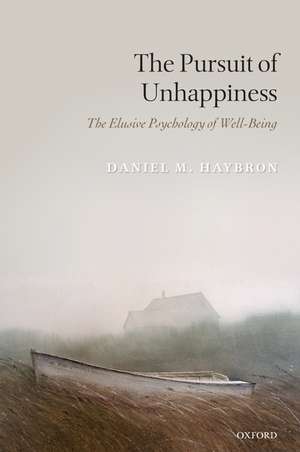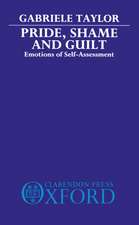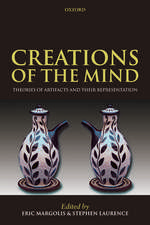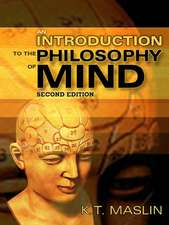The Pursuit of Unhappiness: The Elusive Psychology of Well-Being
Autor Daniel M. Haybronen Limba Engleză Hardback – 25 sep 2008
| Toate formatele și edițiile | Preț | Express |
|---|---|---|
| Paperback (1) | 301.57 lei 31-37 zile | |
| OUP OXFORD – 2 sep 2010 | 301.57 lei 31-37 zile | |
| Hardback (1) | 645.98 lei 31-37 zile | |
| OUP OXFORD – 25 sep 2008 | 645.98 lei 31-37 zile |
Preț: 645.98 lei
Preț vechi: 742.06 lei
-13% Nou
Puncte Express: 969
Preț estimativ în valută:
123.60€ • 129.40$ • 102.28£
123.60€ • 129.40$ • 102.28£
Carte tipărită la comandă
Livrare economică 26 martie-01 aprilie
Preluare comenzi: 021 569.72.76
Specificații
ISBN-13: 9780199545988
ISBN-10: 0199545987
Pagini: 376
Dimensiuni: 162 x 241 x 25 mm
Greutate: 0.73 kg
Editura: OUP OXFORD
Colecția OUP Oxford
Locul publicării:Oxford, United Kingdom
ISBN-10: 0199545987
Pagini: 376
Dimensiuni: 162 x 241 x 25 mm
Greutate: 0.73 kg
Editura: OUP OXFORD
Colecția OUP Oxford
Locul publicării:Oxford, United Kingdom
Recenzii
this is a wonderfully stimulationg, highly original book.
Haybron's book is addressed both to philosophers and to a wider audience of non-specialists. It is written with exemplary clarity and precision. The argument is carefully constructed and supported by a mix of telling examples, illuminating analysis and deft use of empirical research. Haybron is scrupulously honest in assessing the impact of his arguments: his conclusions are carefully nuanced. The result is an engaging and throught-provoking discussion, which poses some penetrating questions for ethicists, political philosophers and psychologists... rich and stimulating
An original and thorough investigation, richly informed by empirical psychology, of almost every topic connected, or seen as connected, with happiness: the self, well-being and virtue, and the good society. It is written in an engaging, often humorous, sometimes poetic, style, and contains a wealth of illustrations from life, literature, film, science, the arts, the news media, and Haybron's own prodigious imagination... It is safe to say that, after this book, happiness will never be the same again.
Subtitled 'the elusive pscychology of well-being', this is a brilliant and comprehensive philosophical treatment of happiness in the psychological sense... The book calls us to rethink our assumptions about the good life and the good society, raising many of the questions explored by Aldous Huxley in Brave New World and Island. All this raises interesting and complex questions for politicians and educationalist as they grapple with introducing happiness studies into the curriculum.
Insightful and imaginative. A serious pleasurable read for those happy enough to explore a difficult subject.
Dan Haybron asks the key philosophical questions about happiness: what is happiness, and how can we know about it, and what is it good for? His book offers insightful answers that are well-grounded in both science and philosophy. The book is full of clear and rigorous arguments, but at the same time it is a pleasure to read. It will be a milestone in the philosophical discussion of happiness.
Dan Haybron has written the definitive philosophical book on happiness, and it is a must-read for scholars of the good life. The work is broad, balanced, and interesting, and yet forcefully presents the case that happiness is a crucial element of good living. In making the argument, Haybron beautifully reviews both the philosophy of happiness, including what this concept means, and the empirical work on the topics arising in fields such as psychology and economics.
Both progress and provocation are vibrantly on display in Dan Haybron's oustanding new book, The Pursuit of Unhappiness. The book is a model of humanistic inquiry: acute philosophical argumentation disciplined by close and careful attention to the latest and best in the sciences of mind, everywhere textured by a keen eye for what it is to be a person - and why it matters.
A prodigious act of scholarship whose comprehensiveness dwarfs previous efforts. The best single source for empirical and philosophical approaches to investigating happiness. A highly nuanced treatment that rewards the reader with its frequent and original insights.
Haybron's book is a perfect example of how philosophical ethics can matter beyond the academy as well as within it. This original book is an acute, engaging, and well-informed discussion of an issue of concern to every human being.
Daniel Haybron has written a rare book that combines philosophical sophistication with detailed knowledge of, and respect for, the psychological literature. He integrates the best that philosophy and psychology have to offer in pursuit of an answer to the question that matters above all others: how we ought to live. The result is a book that will edify psychologists and philosophers alike.
Haybron's treatment of the much exercised concept of happiness...is learned, thoughtful, up to date and illuminating.
This is a very impressive text; rich in argument, empirical psychological findings, and insight.
[This book] takes the reader on an emotionally charged journey... it is a passionate manifesto... Also remarkable is the scope of the discussion, which ranges from philosophical methodology and metaphysics to social science and policy.... Top-notch philosophy.
Haybron's book is an excellent introduction to the problems of happiness and well-being. Though it is written in a rigorous analytic style, behind it there is a praiseworthy moral concern
Haybron's book is addressed both to philosophers and to a wider audience of non-specialists. It is written with exemplary clarity and precision. The argument is carefully constructed and supported by a mix of telling examples, illuminating analysis and deft use of empirical research. Haybron is scrupulously honest in assessing the impact of his arguments: his conclusions are carefully nuanced. The result is an engaging and throught-provoking discussion, which poses some penetrating questions for ethicists, political philosophers and psychologists... rich and stimulating
An original and thorough investigation, richly informed by empirical psychology, of almost every topic connected, or seen as connected, with happiness: the self, well-being and virtue, and the good society. It is written in an engaging, often humorous, sometimes poetic, style, and contains a wealth of illustrations from life, literature, film, science, the arts, the news media, and Haybron's own prodigious imagination... It is safe to say that, after this book, happiness will never be the same again.
Subtitled 'the elusive pscychology of well-being', this is a brilliant and comprehensive philosophical treatment of happiness in the psychological sense... The book calls us to rethink our assumptions about the good life and the good society, raising many of the questions explored by Aldous Huxley in Brave New World and Island. All this raises interesting and complex questions for politicians and educationalist as they grapple with introducing happiness studies into the curriculum.
Insightful and imaginative. A serious pleasurable read for those happy enough to explore a difficult subject.
Dan Haybron asks the key philosophical questions about happiness: what is happiness, and how can we know about it, and what is it good for? His book offers insightful answers that are well-grounded in both science and philosophy. The book is full of clear and rigorous arguments, but at the same time it is a pleasure to read. It will be a milestone in the philosophical discussion of happiness.
Dan Haybron has written the definitive philosophical book on happiness, and it is a must-read for scholars of the good life. The work is broad, balanced, and interesting, and yet forcefully presents the case that happiness is a crucial element of good living. In making the argument, Haybron beautifully reviews both the philosophy of happiness, including what this concept means, and the empirical work on the topics arising in fields such as psychology and economics.
Both progress and provocation are vibrantly on display in Dan Haybron's oustanding new book, The Pursuit of Unhappiness. The book is a model of humanistic inquiry: acute philosophical argumentation disciplined by close and careful attention to the latest and best in the sciences of mind, everywhere textured by a keen eye for what it is to be a person - and why it matters.
A prodigious act of scholarship whose comprehensiveness dwarfs previous efforts. The best single source for empirical and philosophical approaches to investigating happiness. A highly nuanced treatment that rewards the reader with its frequent and original insights.
Haybron's book is a perfect example of how philosophical ethics can matter beyond the academy as well as within it. This original book is an acute, engaging, and well-informed discussion of an issue of concern to every human being.
Daniel Haybron has written a rare book that combines philosophical sophistication with detailed knowledge of, and respect for, the psychological literature. He integrates the best that philosophy and psychology have to offer in pursuit of an answer to the question that matters above all others: how we ought to live. The result is a book that will edify psychologists and philosophers alike.
Haybron's treatment of the much exercised concept of happiness...is learned, thoughtful, up to date and illuminating.
This is a very impressive text; rich in argument, empirical psychological findings, and insight.
[This book] takes the reader on an emotionally charged journey... it is a passionate manifesto... Also remarkable is the scope of the discussion, which ranges from philosophical methodology and metaphysics to social science and policy.... Top-notch philosophy.
Haybron's book is an excellent introduction to the problems of happiness and well-being. Though it is written in a rigorous analytic style, behind it there is a praiseworthy moral concern
Notă biografică
Daniel Haybron is Associate Professor of Philosophy at Saint Louis University. His research interests centre on several issues in ethics: well-being and the good life, moral evil, and the virtues.












